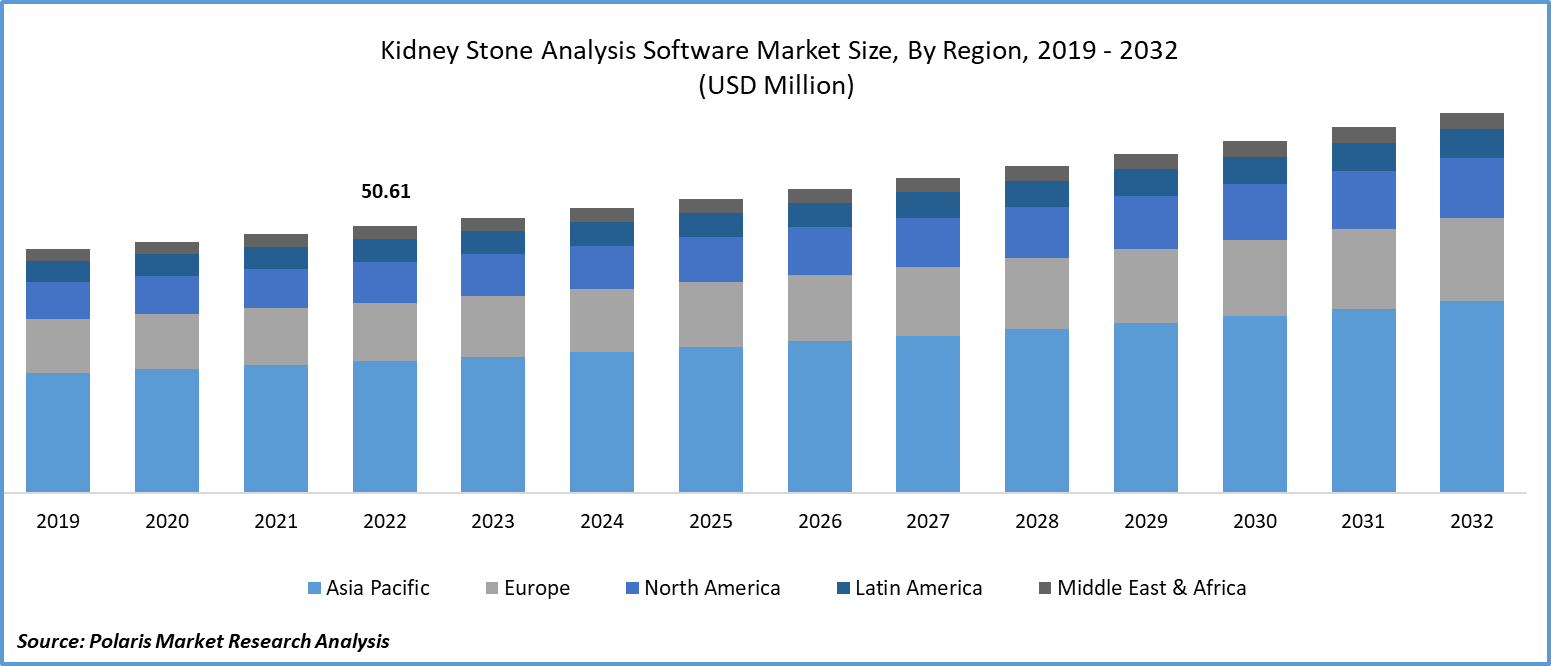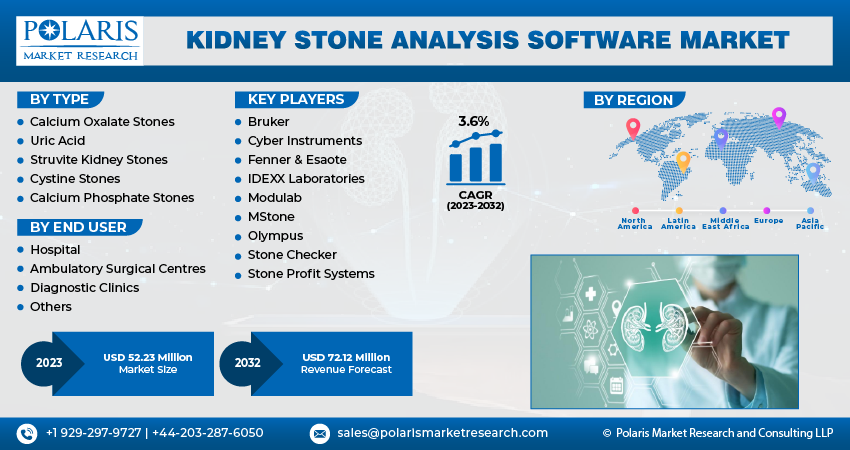
Kidney Stone Analysis Software Market Share, Size, Trends, Industry Analysis Report, By Type (Calcium Oxalate Stones, Uric Acid, Struvite Kidney Stones, Cystine Stones, Calcium Phosphate Stones), By End User; By Region; Segment Forecast, 2023 - 2032
- Published Date:Nov-2023
- Pages: 118
- Format: PDF
- Report ID: PM4050
- Base Year: 2022
- Historical Data: 2019-2021
Report Outlook
The global kidney stone analysis software market was valued at USD 50.61 million in 2022 and is expected to grow at a CAGR of 3.6% during the forecast period.
The rising prevalence of kidney diseases, primarily kidney stones, is creating the need for effective stone analysis software. This software enables healthcare providers to understand the composition of stones and assists in finding solutions to resolve further stone formation in the future.

To Understand More About this Research: Request a Free Sample Report
- According to Scientific Reports in 2023, urinary tract stone composition in a Chinese ethnic community. In the study, relationships between stone types and variables like age, gender, urinary tract infection, earlier urinary stone occurrences in the family, hyperuricemia, and stone position were shown to be statistically significant.
These rising research activities are fueling the opportunities for the development of the stone analysis software kidney stone analysis software market. This demonstrates the need for precise stone analysis and the requirement for cutting-edge computing tools to make it possible.
The global population is experiencing a rise in kidney stones. According to research published in the Clinical Journal of the American Society of Nephrology, kidney stone disease increased by 16% between 1997 and 2012, with 15- to 19-year-olds experiencing the largest increase. Kidney stone incidence was 52% greater in girls and women in this age range. Men started developing the disease more frequently at age 25. This signifies the use case of the stone analysis software market, as it helps kidney stone patients decrease their chance of another stone formation. Kidney stones are one of the reasons patients develop chronic kidney diseases. This is driving the demand for kidney stone analysis software as concerns about chronic kidney diseases rise in the coming years.
Growing research and development activities in the healthcare sector, mainly kidney diseases, are fueling the demand for stone analysis software. A study published in Science Direct in 2023 focused on evaluating the efficacy of applying artificial intelligence (AI) algorithms to decipher FTIR spectra for kidney stone composition characterization. According to the study, errors committed by clinical laboratory technologists can be found and fixed when utilizing AI for quality assurance while analyzing stone spectra.

For Specific Research Requirements: Request for Customized Report
This study's findings are driving healthcare professionals to utilize stone analysis software in diagnosis and treatment decisions. The study highlights the potential for stone analysis software to drastically minimize misclassifications and inaccuracies in the analysis process by identifying and correcting errors produced by human interpreters. This decline in errors results in better patient care and more effective treatment plans. This may inspire more medical institutions, labs, and experts to use AI-enhanced stone analysis software, which would raise demand and lead to market expansion.
Growth Drivers
- Stone analysis software enhances kidney stone diagnosis and treatment.
A stone analysis must be performed to determine the composition of your kidney stone. This aids healthcare practitioners in comprehending the cause of the stone's formation and what can be done to help prevent the formation of further stones in the future. Stone analysis software provides an effective solution for identifying kidney stones in the human body in less time.
With the use of cutting-edge technologies like image processing, spectroscopy, and data analysis, this program can instantly ascertain the composition of kidney stones, which is crucial for precise diagnosis and treatment planning. Stone analysis software facilitates faster and more accurate results by streamlining and automating the analysis process, which benefits patients as well as healthcare providers. Furthermore, healthcare professionals can customize treatment plans for each patient by precisely identifying the stone's composition, increasing the likelihood of a good outcome and lowering the risk of recurrence.
Report Segmentation
The market is primarily segmented based on type, end-user, and region.
|
By Type |
By End User |
By Region |
|
|
|
To Understand the Scope of this Report: Speak to Analyst
By End-User Analysis
- The hospital segment is projected to have the fastest growth in the study period.
The hospital segment is expected to have faster growth in the market. A lot of patients, including those with kidney stone-related problems, are frequently treated in hospitals. A large patient population can benefit from the early diagnosis and suitable treatment planning made possible by stone analysis software, which offers efficient and accurate analysis of kidney stone composition. In addition, hospitals provide all-encompassing medical care as well as specialized divisions like urology.
To identify the sort of kidney stone a patient has, which affects therapy choices, medication, and surgical treatments, urologists must use stone analysis software. In order to deliver precise and quick results, hospitals work to provide cutting-edge diagnostic equipment. By enabling accurate identification of stone components using methods like Fourier transform infrared spectroscopy (FT-IR), stone analysis software improves the diagnostic capabilities of hospitals.
Furthermore, in hospitals, research and instruction are frequently conducted. To better understand kidney stone production and recurrence patterns, researchers and medical professionals can use stone analysis tools to track trends in stone composition. This is driving demand for the stone analysis software market in the coming years.
Regional Insight
- Asia Pacific dominated the global market with the highest growth rate in the study period.
Asia Pacific is expected to experience a higher growth rate for the market. Most of the countries in this region are experiencing a hike in kidney diseases, driving the need for stone analysis software to find the causes of kidney diseases. Based on the article published in the Deccan Herald, around 10% of the Indian population faces chronic kidney diseases. Every year, around 1 lakh cases are reported in India. This signifies the growing demand for accurate diagnostic tools. For a precise diagnosis and efficient treatment planning, stone analysis software is crucial for determining the formation of kidney stones.
According to doctors participating in this discussion, around 31% of all chronic kidney diseases are expected to be caused by diabetes. This signifies that the development of kidney stones is known to be influenced by diabetes and hypertension. Kidney stones are predicted to become more common as diabetes and hypertension become more prevalent in the region. To effectively diagnose and treat kidney stone situations, this could increase demand for stone analysis software.
Competitive Insight
The kidney stone analysis software market is fragmented and is anticipated to witness competition due to several players' presence. Major service providers in the market are constantly upgrading their technologies to stay ahead of the competition and to ensure efficiency, integrity, and safety. These players focus on partnership, product upgrades, and collaboration to gain a competitive edge over their peers and capture a significant market share.
Some of the major players operating in the global market include:
- Bruker
- Cyber Instruments
- Fenner & Esaote
- IDEXX Laboratories
- Modulab
- MStone
- Olympus
- Stone Checker
- Stone Profit Systems
Recent Developments
- In January 2023, Novartis purchased Chinook Therapeutics for more than USD 3.2 billion in order to increase the number of renal disease-specific medications in its portfolio. It is focusing on diversifying its product line.
- In September 2019, Dornier MedTech introduced new OptiVision technology for its Dornier Delta III. The first image post-processing program to enhance stone therapy results.
Kidney Stone Analysis Software Market Report Scope
|
Report Attributes |
Details |
|
Market size value in 2023 |
USD 52.23 million |
|
Revenue Forecast in 2032 |
USD 72.12 million |
|
CAGR |
3.6% from 2023 - 2032 |
|
Base year |
2022 |
|
Historical data |
2019 - 2021 |
|
Forecast period |
2023 - 2032 |
|
Quantitative units |
Revenue in USD million and CAGR from 2023 to 2032 |
|
Segments Covered |
By Type, By End User, By Region |
|
Regional scope |
North America, Europe, Asia Pacific, Latin America, Middle East & Africa |
|
Customization |
Report customization as per your requirements with respect to countries, regions, and segmentation |
